Sending a demand letter is a crucial step to kickstart the legal process of seeking compensation for an injury after an accident. But how does a demand letter work, exactly? Our attorneys explain how sending a demand letter works, how long after a demand letter is sent can you expect a response, and what you should expect along the way.
What Is a Demand Letter?
A demand letter serves as a formal document that an attorney may write on behalf of their client and send to the party who may be financially responsible for their client’s damages. It outlines the details of the incident, describes the extent of the client’s injuries and damages, and states how much compensation the client wishes to receive. The victim can seek damages for lost wages, medical bills, and other expenses caused by the accident.
In other words, the purpose of a demand letter is to formally notify the responsible party of their legal obligations and allow them to settle the matter before escalating it to court. For example, suppose you’ve been hurt in a car accident. One of your options to recover compensation is to write a demand letter to the at-fault driver’s insurance explaining what happened and why the other party was at fault.
You can also include clear information about your injuries, the damages you may have sustained after the car accident, and the compensation you want to receive. You may also include any documentation about the accident, such as police reports and medical bills.
Timeframe For Settlement After Demand Letter
While most insurance companies may respond to a demand letter within a few days or weeks of receiving it, there is no legal deadline for the insurance company to respond to your letter. It is usually in their interest to close any claims as quickly and efficiently as possible, especially once you have formally notified them that you have retained a personal injury lawyer to represent you and may be taking legal action against them if no settlement agreement is possible.
Generally speaking, each personal injury case is unique, and several factors may cause some claims to move more quickly than others. For instance, the insurance company may take a lot more time to investigate a more complex case due to the claimant’s severe injuries and the higher amount of compensation the claimant may be seeking.
There is one deadline to which you will want to pay attention. If you plan on taking legal action and filing a lawsuit to recover compensation, you must be aware of your state’s statute of limitations for personal injuries. For example, personal injury victims in South Carolina have no more than three years to begin a lawsuit, counting from when the accident occurred. So, while the insurance company is not required to respond to a demand letter within any particular deadline, you may consult an attorney if you believe your case has been pending for too long and you are approaching the 3-year deadline. This is crucial because once the statute of limitations expires, you won’t likely be able to receive any compensation for your damages.
Factors That Can Influence The Time It Takes To Reach A Settlement
Settling a claim is rarely a one-size-fits-all process. The settlement timeline post demand letter can range from a few weeks to several months, depending on negotiations and legal proceedings. How long to get a settlement after a demand notice depends on various factors, including the complexity of the case and the responsiveness of the involved parties
The complexity of the case is one of the biggest reasons for delays. Simple cases, where liability is clear and the damages are straightforward, tend to settle faster. On the other hand, cases with disputed facts, multiple parties, or complex legal issues may require extensive negotiations and evidence review before an agreement is reached.
The responsiveness of the insurance company or the opposing party also matters. Some insurers or defendants respond promptly, eager to resolve the matter efficiently, while others delay intentionally, hoping to minimize settlement payout or wear the claimant down. If the party receiving the demand letter is slow to reply or requests additional documentation repeatedly, the settlement process can stretch out longer than anticipated.
Another factor is the amount of money being demanded. Larger settlement amounts naturally lead to more scrutiny and negotiations. Insurance companies and defendants often resist paying substantial sums without exhausting all possible arguments against liability or damages. Lower settlement amounts in an insurance claim, especially those within policy limits, are more likely to be approved quickly.
Medical treatment also plays a role. In personal injury cases, settlements often depend on knowing the full extent of the victim’s injuries. If the injured party is still receiving medical treatment or awaiting final diagnoses, settlement discussions may be postponed until a clearer picture of long-term costs emerges. Premature settlements can lead to underestimated damages and insufficient compensation for ongoing healthcare needs.
Legal strategy can influence the timeline as well. Attorneys often advise waiting until all evidence is collected before negotiating a settlement, while others push for early resolutions depending on their approach. The presence of expert witnesses, formal investigations, or additional legal filings can prolong discussions. Some cases even escalate to trial if a fair settlement cannot be reached, further extending the time frame.
Each of these factors contributes to the duration of settlement negotiations. While demand letters set the process in motion, the journey toward resolution depends on the complexities of the case, the responsiveness of the involved parties, and the legal strategies employed.
What Happens After the Insurance Company Receives My Demand Letter?
Once the insurance company receives your demand letter, they may take some time to review your case, examine the evidence provided, and, in some cases, investigate your claim. After that, they may respond to your letter, letting you know if it was denied or accepted. They may also respond with an offer or request for evidence.
Denial
If the insurance company believes you do not have a valid claim or their policy does not cover the damages you seek, they may deny your claim. If they deny your claim, the insurance company will usually explain their reasons for the denial. You can also request a written justification of the denial if they do not provide one.
Offer
Sometimes, the insurance company may respond to your demand letter with an offer to settle your case. The amount of their offer is usually lower than the amount you are seeking. You are not obligated to accept their offer and should consider reviewing it with an attorney before deciding.
Request for Evidence
When the insurance company believes that they do not have enough information, they may respond to your letter requesting further evidence to support your claim and document your damages. They may ask for medical records, photographs, or witness statements. It is crucial to provide the requested evidence promptly and accurately to avoid further delays on your claim.
Acceptance
The best possible outcome is receiving a positive response from the insurance company notifying you that they have accepted your demand letter. This can happen if they agree with all the details and evidence you provided in your letter and are willing to offer you a settlement.
What Should I Do if I Receive No Response to My Demand Letter?
If you have not received a response to your demand letter within a reasonable time, you can contact them to ask for an update. If you feel like the insurance company is still not responding or acting in bad faith, you may want to contact your attorney to learn your options and see if taking legal action is the right choice for your case. If you need a strong legal ally to help you receive compensation for your injury, call Armada Law. We can represent clients involved in any type of personal injury accident and fight for maximum compensation on their behalf.
Common Challenges Faced During This Process
Settling a legal dispute is rarely a straightforward task. The process is filled with obstacles that can create frustration and delays. Many claimants enter negotiations expecting a swift resolution, only to find themselves caught in unexpected hurdles that slow everything down.
One of the biggest challenges is dealing with insurance companies. These companies are businesses first, and their goal is to minimize settlement payouts wherever possible. They often respond to demand letters with lowball offers or outright denials, requiring extensive back-and-forth negotiations. Claimants must be prepared to push for fair compensation and not accept the first offer without careful review.
Another difficulty is gathering sufficient evidence. A demand letter is strongest when it is supported by solid documentation, including medical records, expert opinions, and proof of damages. If evidence is incomplete or disputed, the opposing party may delay responding or challenge the claim’s validity. Obtaining necessary documents and expert statements can take time, especially when medical professionals or specialists are involved.
Legal tactics can also complicate the process. Defendants and insurance companies use various strategies to stall negotiations, such as requesting additional paperwork, disputing liability, or dragging out responses. These delays can be frustrating, but they are often intentional. Some companies hope that claimants will get tired of the process and settle for less than they deserve.
Miscommunication is another common obstacle. Settlement discussions require clear and timely communication between all parties involved. If there are delays in responses, misunderstandings about settlement terms, or conflicting information, the process can slow down significantly. Our experienced personal injury attorney can help you navigate these issues, but even with legal support, miscommunication can arise.
The emotional stress is an overlooked challenge. The waiting period, the uncertainty of negotiations, and the fear of receiving an unfair outcome can take a mental and emotional toll. Many individuals feel pressured to settle early just to bring an end to the ordeal, but rushing into an agreement without proper consideration can lead to regrettable decisions.
While these challenges are frustrating, they are not insurmountable. Understanding the potential roadblocks ahead of time allows claimants to be better prepared, making the process smoother and reducing unnecessary delays.
Legal Assistance In Navigating The Complexities Of Demand Letters And Settlements
Having the right legal guidance makes all the difference when dealing with settlements, and at Armada Law, we are dedicated to providing that support. Demand letters may seem like simple requests for compensation, but they are carefully crafted legal documents designed to initiate serious negotiations. The way a demand letter is written, the supporting evidence included, and the timing of its submission all play a crucial role in its effectiveness. A well-structured demand letter can go a long way in helping your claim.
At Armada Law, we understand the complexities of demand letters and ensure they are structured in a way that maximizes their impact. Our team knows exactly how to draft a strong demand letter, what details to include, how to frame the argument, and how to anticipate counterarguments from the opposing party. Without proper legal guidance, a poorly drafted demand letter can weaken a case rather than strengthen it.
Beyond just writing demand letters, we take an active role in the negotiation process. We handle all correspondence with insurance companies, carefully review settlement offers, and advise our clients on whether to accept an offer or push for more.
Settlements also involve complex paperwork and documentation, and our legal team ensures that all damages are accurately accounted for. Whether it is medical expenses, lost wages, or future costs related to an injury, we compile all relevant information in a way that strengthens the personal injury claim and avoids missing critical financial details. We can also work with you to consider other alternative dispute resolution methods
Another major advantage of working with Armada Law is the protection we provide against unfair practices. Insurance companies and opposing parties sometimes engage in bad-faith negotiations, denying valid claims or delaying responses unnecessarily. Our attorneys know how to identify these tactics and push back, ensuring that our clients are not taken advantage of. In cases where negotiations fail, we prepare clients for litigation. While most settlements are resolved outside of court, some cases require legal action to achieve fair compensation. Contact us to schedule your free consultation to draft a well-written demand letter and secure a timely settlement.
When you’ve been affected by someone else’s actions and ended up being hurt and suffering personal injury damages, a personal injury settlement is meant to work as a way to undo the damage and put you in the position you would have been in if the incident had never occurred.
But do you need to worry about paying taxes on the money you received as a settlement? Our attorneys explain when a personal injury settlement may be subject to taxes and what to do if you need help.
What Is Included in a Personal Injury Settlement?
Most personal injury settlements include compensation for standard damages, which are economic and non-economic damages resulting from the event that led to an injury (such as a car accident or a slip-and-fall injury due to someone else’s negligence).
Economic damages are financial losses and expenses resulting from the accident and can include medical bills, lost wages, and the cost of repairing or replacing damaged property. For example, if you were hurt in a car accident, economic damages may cover your hospital bills and the cost of replacing your vehicle.
Non-economic damages cover the more subjective impact of a car accident and can include payment for pain, suffering, and emotional distress due to the accident, injury, and recovery process. In addition, some cases may allow for the plaintiff to recover punitive damages, which is additional compensation the defendant is required to pay on top of standard damages. Punitive damages may be available in cases involving gross negligence and act as a way to punish the defendant for their behavior.
Do I Have to Pay Taxes on My Personal Injury Settlement?
If you have received a significant lump sum as a result of a personal injury claim or lawsuit, it is important to know whether the money you received is taxable. The good news is that at the federal level, money received from a personal injury settlement is not counted as gross income and, thus, is not taxable.
According to section 104 of the Internal Revenue Code, “(…), gross income does not include (1) amounts received under workmen’s compensation acts as compensation for personal injuries or sickness; (2) the amount of any damages (other than punitive damages) received (whether by suit or agreement and whether as lump sums or as periodic payments) on account of personal physical injuries or physical sickness.”
However, if you claimed an itemized deduction for medical expenses related to your personal injury claim and received money from the Internal Revenue Service (IRS) for those deductions, you may have to pay taxes on the portion of your settlement meant to cover those medical expenses. For example, if you claimed $4000 in medical expenses in your tax return and received a refund based on those expenses, you may have to declare $4000 of your settlement as taxable income.
It is also worth mentioning that most personal injury settlements are generally not taxed at the state level. However, each state has different laws and exceptions, so you may want to consult the tax laws of your state to check whether you owe any taxes on your settlement.
Exceptions in Taxability for Certain Types of Damages
When people receive a settlement for personal injury, they often wonder – are injury settlements taxable? They might assume that all of the money is theirs to keep without worrying about taxes. In many cases, that is true, but there are important exceptions. The IRS makes distinctions between different types of damages, and not everything is exempt from taxation.
Based on personal injury settlement tax rules, compensatory damages for physical injuries or illnesses are generally not taxable. If the settlement covers medical expenses, pain and suffering related to those injuries, or any direct costs associated with treatment, those amounts can usually be excluded from taxable income for personal injury claims. However, if medical expenses were previously deducted on a tax return, then that portion of the settlement might be taxable when reimbursed.
On the other hand, emotional distress can be treated differently. If the emotional suffering stems from a physical injury, the settlement is often tax-free. But if it is purely mental anguish with no physical harm involved, then the IRS may consider it taxable income. This distinction can make a big difference in how much of the settlement needs to be reported.
Punitive damages are another category that does not qualify for exemption. These are payments intended to punish the responsible party rather than compensate for actual losses. No matter the reason they are awarded, punitive damages are always considered taxable income.
Lost wages are another taxable exception. If a person receives money to make up for income they would have earned from their job, that part of the settlement is treated just like regular wages. It is subject to the same taxes that would have applied if the person had been able to work and earn that money normally.
Interest on settlements is also taxable. Sometimes settlements are not paid out immediately, and they may accumulate interest while waiting for disbursement. Any interest earned on that amount is considered taxable income, just like interest from a savings account.
Are Punitive Damages or Wrongful Death Settlements Taxable?
As explained above, punitive damages are meant to punish the defendant in a personal injury case when that person’s actions could be considered gross negligence. Punitive damages are paid in addition to standard damages and may be counted as taxable income. This is because the main objective of this category of damages is to punish egregious behavior rather than compensate the victim. In practical terms, it results in additional compensation for the plaintiff on top of whatever else they have received to make themselves “whole” and may therefore be subject to taxation.
On the other hand, a wrongful death claim is meant to compensate the surviving relatives of a personal injury victim for the losses resulting from their loved one’s accident, injury, and death. A wrongful death settlement includes compensation for medical bills, funeral expenses, lost wages, loss of consortium, and pain and suffering the decedent may have endured during the accident.
While no amount of compensation can make up for the loss of a loved one, the compensation given to relatives of a wrongful death victim is supposed to be a way to make them whole, i.e., to put them back in the state they were before the accident. For these reasons, wrongful death settlements are typically not taxable at the federal level and are usually paid to the decedent’s estate. As always, check the laws applicable to your state to determine whether any taxes are owed.
What Should I Do if I Am Still Not Sure About Paying Taxes on My Settlement?
It is normal to feel a bit confused about whether you owe any taxes on your settlement or not since the laws may be full of exceptions and difficult to understand. However, the last thing any personal injury plaintiff wants is to find themselves in trouble with the IRS after all they have endured. It is always best to talk to your attorney about any questions you may have, and you may also want to consult a tax professional.
If you have been hurt in an accident caused by someone else, the legal team at Armada Law is ready to help you fight for your rights. Our team serves injury victims in South Carolina, North Carolina, and Georgia. Reach out to our office and request a free case review.
Tips For Ensuring Compliance With Tax Obligations
Staying informed and taking proactive steps can make a significant difference in ensuring compliance with tax obligations. One key step is keeping detailed records. Documentation matters when dealing with taxes, and having organized records of the settlement agreement, medical expenses, and any related financial transactions helps ensure accurate reporting. Keeping all relevant paperwork readily accessible can prevent confusion when tax time arrives.
It is also important to set aside money for any taxes that might be owed. While some parts of a settlement may be tax-free, others could require payment to the IRS. Preparing for that possibility by budgeting accordingly can prevent financial strain. No one wants to be caught off guard by an unexpected tax bill.
Seeking professional advice early is another smart move. Consulting a tax expert can help clarify any uncertainties and ensure compliance. Laws can be complicated, and having an experienced professional review the details can provide peace of mind. A knowledgeable advisor can also suggest ways to legally minimize tax liability, helping clients keep more of their settlement funds.
Being proactive and informed is the best approach. By taking the right steps and working with professionals when needed, settlement recipients can ensure they meet all tax requirements without unnecessary complications.
How Armada Law Can Assist With Tax Queries In Settlements
Dealing with the tax implications of a personal injury settlement can feel overwhelming. With different rules applying to various types of compensation, it is easy to get confused about what is taxable and what is not. That is where Armada Law can step in and offer much-needed clarity.
Armada Law understands how tax laws apply to settlements and can help clients navigate the details with confidence. Whether it is determining which portions of a settlement are taxable or ensuring that all necessary documentation is in order, our team provides guidance tailored to each case. We take the guesswork out of the process, making sure no important details are overlooked.
Tax laws can change, and their complexities mean that even small mistakes can lead to unexpected tax liabilities. Armada Law stays up to date with the latest regulations, helping clients avoid costly errors. We provide clear explanations, breaking down legal jargon into simple terms so that clients fully understand their obligations. Our goal is to make the process as smooth and stress-free as possible.
Beyond just explaining the tax aspects, Armada Law can also work alongside financial advisors or accountants to ensure that everything is properly handled when filing taxes. This collaboration helps prevent surprises down the road and ensures that settlement recipients remain in compliance with tax laws. By having experienced professionals involved, clients can focus on moving forward with their lives rather than worrying about financial complications. To learn more about whether personal injury settlements are taxable or not, please contact us to schedule a consultation with our personal injury lawyer.









